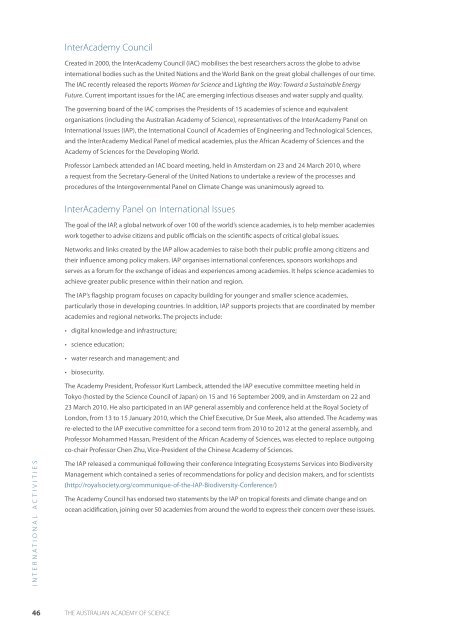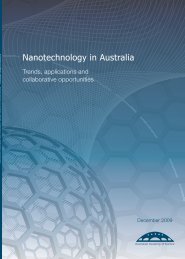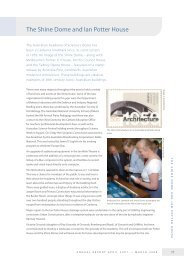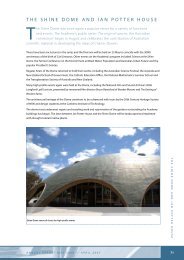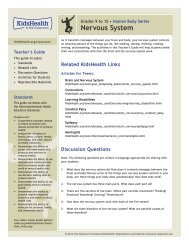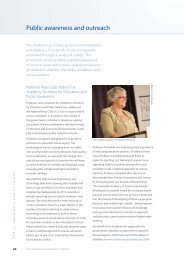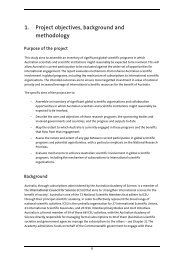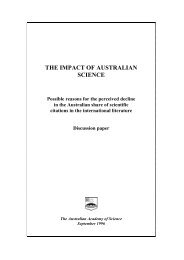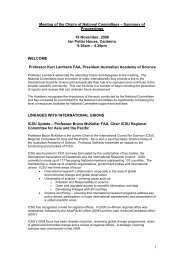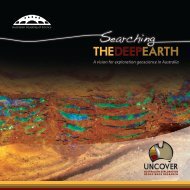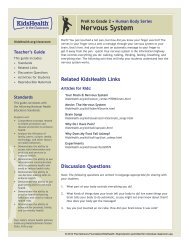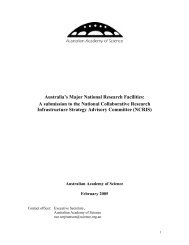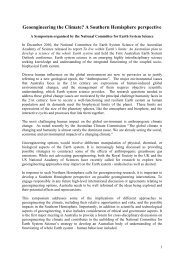ANNUAL REPORT - Australian Academy of Science
ANNUAL REPORT - Australian Academy of Science
ANNUAL REPORT - Australian Academy of Science
You also want an ePaper? Increase the reach of your titles
YUMPU automatically turns print PDFs into web optimized ePapers that Google loves.
Inter<strong>Academy</strong> Council<br />
Created in 2000, the Inter<strong>Academy</strong> Council (IAC) mobilises the best researchers across the globe to advise<br />
international bodies such as the United Nations and the World Bank on the great global challenges <strong>of</strong> our time.<br />
The IAC recently released the reports Women for <strong>Science</strong> and Lighting the Way: Toward a Sustainable Energy<br />
Future. Current important issues for the IAC are emerging infectious diseases and water supply and quality.<br />
The governing board <strong>of</strong> the IAC comprises the Presidents <strong>of</strong> 15 academies <strong>of</strong> science and equivalent<br />
organisations (including the <strong>Australian</strong> <strong>Academy</strong> <strong>of</strong> <strong>Science</strong>), representatives <strong>of</strong> the Inter<strong>Academy</strong> Panel on<br />
International Issues (IAP), the International Council <strong>of</strong> Academies <strong>of</strong> Engineering and Technological <strong>Science</strong>s,<br />
and the Inter<strong>Academy</strong> Medical Panel <strong>of</strong> medical academies, plus the African <strong>Academy</strong> <strong>of</strong> <strong>Science</strong>s and the<br />
<strong>Academy</strong> <strong>of</strong> <strong>Science</strong>s for the Developing World.<br />
Pr<strong>of</strong>essor Lambeck attended an IAC board meeting, held in Amsterdam on 23 and 24 March 2010, where<br />
a request from the Secretary-General <strong>of</strong> the United Nations to undertake a review <strong>of</strong> the processes and<br />
procedures <strong>of</strong> the Intergovernmental Panel on Climate Change was unanimously agreed to.<br />
Inter<strong>Academy</strong> Panel on International Issues<br />
The goal <strong>of</strong> the IAP, a global network <strong>of</strong> over 100 <strong>of</strong> the world’s science academies, is to help member academies<br />
work together to advise citizens and public <strong>of</strong>ficials on the scientific aspects <strong>of</strong> critical global issues.<br />
Networks and links created by the IAP allow academies to raise both their public pr<strong>of</strong>ile among citizens and<br />
their influence among policy makers. IAP organises international conferences, sponsors workshops and<br />
serves as a forum for the exchange <strong>of</strong> ideas and experiences among academies. It helps science academies to<br />
achieve greater public presence within their nation and region.<br />
The IAP’s flagship program focuses on capacity building for younger and smaller science academies,<br />
particularly those in developing countries. In addition, IAP supports projects that are coordinated by member<br />
academies and regional networks. The projects include:<br />
• digital knowledge and infrastructure;<br />
• science education;<br />
• water research and management; and<br />
• biosecurity.<br />
The <strong>Academy</strong> President, Pr<strong>of</strong>essor Kurt Lambeck, attended the IAP executive committee meeting held in<br />
Tokyo (hosted by the <strong>Science</strong> Council <strong>of</strong> Japan) on 15 and 16 September 2009, and in Amsterdam on 22 and<br />
23 March 2010. He also participated in an IAP general assembly and conference held at the Royal Society <strong>of</strong><br />
London, from 13 to 15 January 2010, which the Chief Executive, Dr Sue Meek, also attended. The <strong>Academy</strong> was<br />
re-elected to the IAP executive committee for a second term from 2010 to 2012 at the general assembly, and<br />
Pr<strong>of</strong>essor Mohammed Hassan, President <strong>of</strong> the African <strong>Academy</strong> <strong>of</strong> <strong>Science</strong>s, was elected to replace outgoing<br />
co-chair Pr<strong>of</strong>essor Chen Zhu, Vice-President <strong>of</strong> the Chinese <strong>Academy</strong> <strong>of</strong> <strong>Science</strong>s.<br />
INTERNATIONAL ACTIVITIES<br />
The IAP released a communiqué following their conference Integrating Ecosystems Services into Biodiversity<br />
Management which contained a series <strong>of</strong> recommendations for policy and decision makers, and for scientists<br />
(http://royalsociety.org/communique-<strong>of</strong>-the-IAP-Biodiversity-Conference/)<br />
The <strong>Academy</strong> Council has endorsed two statements by the IAP on tropical forests and climate change and on<br />
ocean acidification, joining over 50 academies from around the world to express their concern over these issues.<br />
46<br />
THE AUSTRALIAN ACADEMY OF SCIENCE


